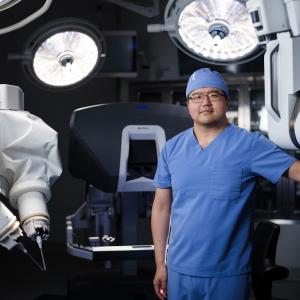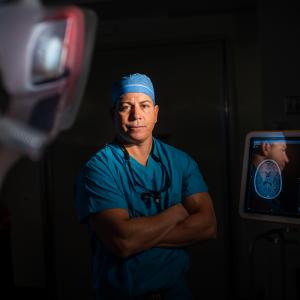
Chief quality officer Dr. Ilseung Cho discusses NYU Langone’s across-the-board top accolades for care quality and safety.
PHOTO: NYU LANGONE STAFF
Ilseung Cho, MD, has served as assistant chief quality officer and now chief quality officer for NYU Langone Health during a remarkable era for the hospital system. From a near-collapse in the mid-2000s, NYU Langone has transformed into a national beacon of healthcare quality and innovation, with its top marks extending to NYU Langone Hospital—Brooklyn, NYU Langone Hospital—Long Island, and its ambulatory network of more than 320 outpatient practices.
That journey has earned NYU Langone a remarkable number of national accolades for healthcare quality, accountability, education and research, including top honors in U.S. News & World Report’s “Best Hospitals” and “Best Medical Schools,” Vizient, Inc.’s Ambulatory Care Quality and Accountability Ranking, Leapfrog’s Hospital Safety Grade, and the Centers for Medicare and Medicaid Services’ five-star rating system.
Here, Dr. Cho shares his view of how NYU Langone has managed its challenging times and continued growth while successfully pursuing its mission to provide the highest-quality care for all of its patients.
What is a chief quality officer? What are they responsible for in a hospital system?
As chief quality officer, I’m charged with the overall direction, leadership, and operational management of the quality programs throughout NYU Langone’s health system. My role is to provide leadership and support to the array of quality improvement and safety activities that we are constantly pursuing.
What does the word “quality” mean in a healthcare system?
It means valuing the same things that our patients value. When patients come to our hospital, they want to be cared for effectively and empathetically. They don’t want to experience a preventable incident or infection. And they want to go home to their loved ones quickly. While the quality metrics we use in the hospital may sometimes be complex, they are fundamentally focused on these same goals of caring for every patient effectively and safely.
What motivated you to take on this work?
This work is very personal for me, just as it is for our patients and their families. My interest in quality and safety took root after a family member of mine experienced a surgical site infection. When we were told that these infections almost never happen, that was of little consolation. It felt like something being said to make the surgeon feel better, rather than my family member.
“My interest in quality and safety took root after a family member of mine experienced a surgical site infection. When we were told that these infections almost never happen, that was of little consolation.”—Ilseung Cho, MD
What I took away from that experience is that each of the measures we track represents a real outcome for those who entrust us with their care. That is why NYU Langone’s mission to constantly improve the quality of the care we deliver never ends. We continually strive to reduce mortalities, reduce preventable harm, and improve the experiences that our patients have when they interact with our health system.
NYU Langone relies on a signature dashboard that tracks more than 800 metrics—the most extensive in the nation. How do you make data-driven medicine relevant and personal to everyone working here?
NYU Langone’s leadership has made an exceptional commitment to fostering a culture where all clinicians and staff are encouraged to be open about their challenges and successes. In my role, the most valuable information I receive often comes from those who are frequently at the patient’s bedside or in the hallways and waiting rooms. For example, a recent conversation I had with one of our transport staff in an elevator revealed opportunities to improve their workflow and efficiency. It was one of the most helpful discussions I had that week.
“Even our most sophisticated dashboard or metric is not NYU Langone’s secret sauce. Our secret sauce is how we engage every clinician and staff member who feels dedicated to the service of helping patients and improving care.”
That is why I say that even our most sophisticated dashboard or metric is not NYU Langone’s secret sauce. Our secret sauce is how we engage every clinician and staff member who feels dedicated to the service of helping patients and improving care.
Looking back, how would you distill the success story that allowed NYU Langone to rebound and achieve the nation’s top quality and outcomes measures across a growing network of hospitals?
In my opinion, the change we’ve accomplished over the past 15 years has been driven by 2 primary components: culture and data. Culture defines what is important or not to an organization like ours. And we have planted our flag around providing the highest quality of care. Every member of this organization understands this mission because it’s part of the fabric of our culture.
VIDEO: Dr. Ilseung Cho discusses why quality and safety matter for patients, and how Vizient rankings are a valuable resource for us to understand how NYU Langone performs compared to other healthcare systems around the country.
Along with that, we have been very innovative about the use of data, metrics, and goal-setting. We’ve created a remarkable system to measure the quality of care, to identify whether we are adhering to our processes, and to share that data transparently across our entire healthcare system.
“We have set the expectation that all of our patients receive the same high quality of care.”
We also insist that the quality of care we deliver is uniform and consistent throughout all our inpatient locations. We have set the expectation that all our patients receive the same high quality of care, regardless of whether they come to us in Manhattan, Brooklyn, or Long Island. While many other health systems report only on their “flagship” hospital to boost their quality rankings, our top ratings reflect the aggregate performance of all of our inpatient locations.
What are your top priorities ahead to continue advancing quality and outcomes?
Equity and healthcare disparities are the next challenge that we must overcome. We acknowledge that the healthcare system in this country has provided disparate and inequitable care for a long time. We have a moral obligation to address this and to eliminate biases wherever we uncover them, whether they relate to race, ethnicity, sexual orientation, or gender identity. This is a challenge, but I’m confident that—given the commitment of NYU Langone’s leadership and staff—we can lead this change.
You’ve said the unique experiences of New Yorkers have shaped how NYU Langone operates and adapts quickly and effectively to its challenges. Can you elaborate?
Our health system has weathered catastrophic events like the blackout of 2002, Hurricane Sandy in 2012, and the first wave of COVID-19 in 2020—and emerged stronger and more resilient. Not a day goes by that I’m not in wonder and grateful for the people we have here at NYU Langone.
“Our inpatient facilities reflect what is incredible about New York, and our teams bring incredible energy and innovation drawn from the rich diversity of our communities.”
There is no hospital system better suited to take care of New York City. Our inpatient facilities reflect what is incredible about New York, and our teams bring incredible energy and innovation drawn from the rich diversity of our communities. Our work ethic mirrors the grit that we see in our families and friends.

